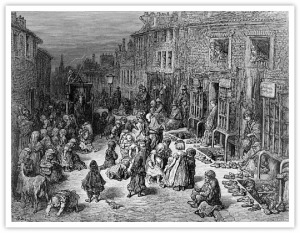Polly Toynbee – No Exit: Britain’s Social Housing Trap
No comments yettheguardian.com. November 2014. To estate agents, England’s Lane, tucked away in a corner of Hampstead, is one of London’s most sought-after villages. Along its tree-lined length stretches a charming row of small shops, with a tearoom serving gentlemen’s relish on toast, a toy shop full of hand-crafted wooden toys, and a butcher that sells pheasant and grouse. In the window of the DesRes estate agency, flats are offered for rent at £1,500 a week, and just opposite, down a private side road, a seven-bedroom arts-and-crafts style mansion, set in a garden the size of a small park, is on sale for £6.7m.
Walking along England’s Lane, passersby might not notice a mildly forbidding building behind railings, an old nurses’ home that in 2004 was turned into a hostel for Camden’s homeless families, despite protests from local homeowners that it was “not suitable” for the location. The 160 families squeezed into this large red brick block do not visit the shops and cafes here, nor do they get facials at the naturopathic beauty salon, or gaze at the estate agent’s window. Each family has a very small room, originally designed for a single student nurse.
The England’s Lane hostel was intended to provide temporary accommodation for homeless families; however, once they move in here, “temporary” can mean years. The hostel is a modern day version of Dickens’s Marshalsea prison from Little Dorrit, a reluctant community with its own hierarchy of suffering, where years are ticked off by unlucky people who have run aground for one reason or another.
Read more: http://www.theguardian.com/news/no-exit-britains-housing-trap?
You May Also Like
Comments
Leave a Reply







